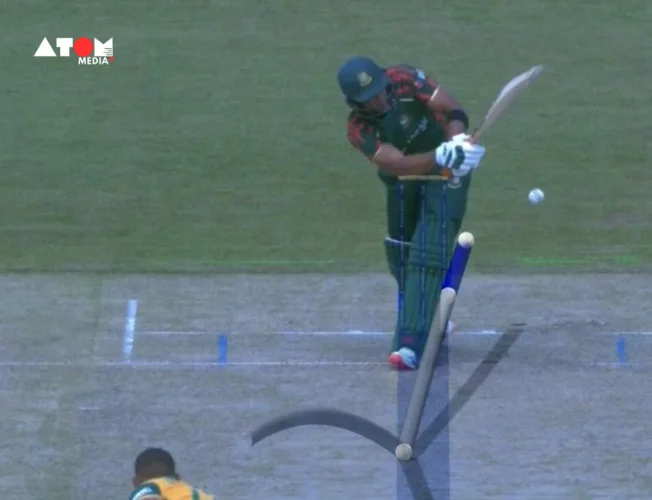DRS Controversy in South Africa vs Bangladesh Match
In a thrilling encounter at the T20 World Cup 2024, South Africa secured a narrow 4-run victory over Bangladesh, a match marred by a significant DRS controversy. Bangladesh, needing 27 runs from the last 4 overs, appeared to be in a strong position until an umpiring decision turned the game in South Africa’s favor.
The Controversial Moment
The controversy unfolded in the 17th over of Bangladesh’s innings with Mahmudullah and Towid Hridoy at the crease. On the second ball of the over, Mahmudullah attempted a flick, but the ball struck his pads and raced to the boundary behind the stumps. South Africa appealed strongly, and the umpire raised his finger, declaring Mahmudullah out. Bangladesh immediately reviewed the call, and DRS showed that the ball wouldn’t have hit the stumps, leading the on-field umpire to reverse his decision.
Despite the reversal, the boundary was not credited to Bangladesh’s total because the ball was considered dead once the umpire raised his finger, as per the ICC rules. This decision ultimately cost Bangladesh the match, as they lost by just 4 runs.
Social Media Reactions
The incident sparked widespread outrage on social media, with many suggesting that Mahmudullah was a victim of a loophole in the rulebook. Former India cricketer Wasim Jaffer voiced his frustration on X (formerly Twitter), stating, “Mahmudullah was wrongly given out LBW, the ball went for four leg byes. The decision was reversed on DRS. Bangladesh didn’t get the 4 runs as the ball is dead once the batter is given out, even if wrongly. And SA ended up winning the game by 4 runs. Feel for Bangladesh fans.”
Jaffer’s tweet highlighted the frustration felt by many cricket fans who believed that Bangladesh was unfairly deprived of a victory due to an outdated rule.
ICC Rule Explanation
The ICC rulebook on this matter is clear but controversial. According to the rules:
Clause 3.7.1 states: “If following a Player Review request, an original decision of Out is changed to Not out, then the ball is still deemed to have become dead when the original decision was made. The batting side, while benefiting from the reversal of the dismissal, shall not benefit from any runs that may subsequently have accrued from the delivery had the on-field umpire originally made a Not out decision, other than any No ball penalty that could arise.”
Clause 3.7.2 states: “If an original decision of Not out is changed to Out, the ball shall retrospectively be deemed to have become dead from the moment of the dismissal event. All subsequent events, including any runs scored, shall be ignored.”
Law 20.1.1.3 of the Dead Ball law states: “A batter is dismissed. The ball will be deemed to be dead from the instant of the incident causing the dismissal.”
Impact on the Match
This interpretation of the dead ball rule had a significant impact on the outcome of the match. With the boundary not being counted, Bangladesh missed out on crucial runs that could have led them to victory. The decision brought to light the need for a review of the rules to prevent such controversies in the future.
Bangladesh’s Response
Bangladesh’s players and fans were visibly disappointed by the decision. The team’s captain expressed his frustration in the post-match conference, stating that such decisions are tough to accept, especially in crucial matches. He emphasized the need for clearer and fairer rules to ensure that teams do not suffer due to technicalities.
South Africa’s Perspective
From South Africa’s perspective, the decision worked in their favor, allowing them to secure a narrow win. Their captain acknowledged the controversy but pointed out that the team played according to the rules and benefitted from the existing regulations.
Call for Rule Change
The incident has reignited the debate over the fairness of the dead ball rule in such situations. Many cricket experts and former players have called for the ICC to review and amend the rule to ensure that runs scored from deliveries that are incorrectly adjudged do not unfairly disadvantage the batting side.
Wasim Jaffer’s comments on social media have further fueled the call for change. He stated that while the current rulebook was followed, it did not reflect the spirit of fair play. Jaffer and others have suggested that the ICC should consider a rule change to ensure that such incidents do not affect the outcomes of important matches.
The South Africa vs Bangladesh match in the T20 World Cup 2024 will be remembered for the thrilling gameplay and the controversial umpiring decision that played a decisive role in the outcome. As cricket evolves, it is crucial for governing bodies to adapt the rules to ensure fairness and maintain the integrity of the game. The DRS controversy has highlighted a significant area for improvement, and it remains to be seen if the ICC will take steps to address this issue in future tournaments.
Read more: Marketing News, Advertising News, PR and Finance News, Digital News





